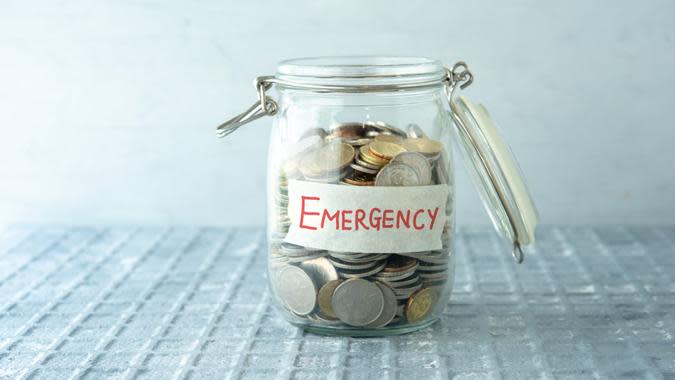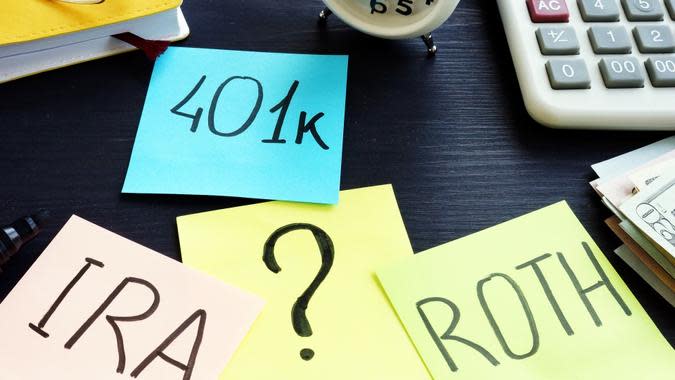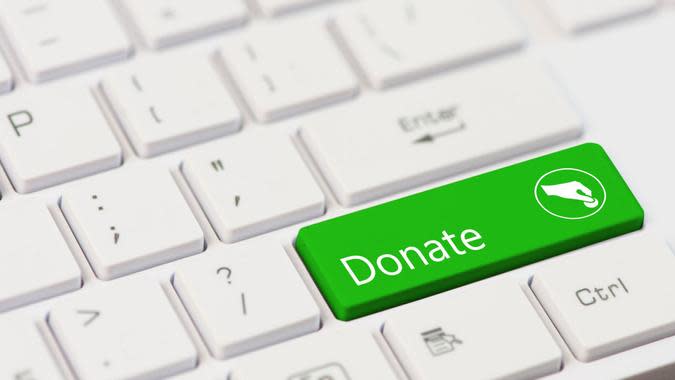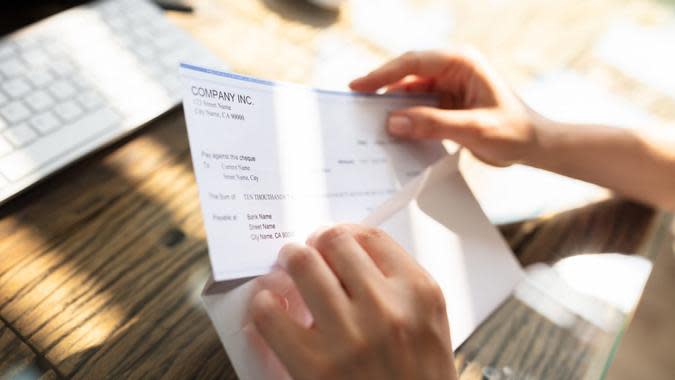9 Things You Must Do When Your Tax Refund Is More Than $5,000

According to a recent GOBankingRates survey about taxes, the top three things people are planning to do with their refunds are put it in savings, pay off debt or pay bills.
Read More: This Is the One Type of Debt That ‘Terrifies’ Dave Ramsey
Learn More: Owe Money to the IRS? Most People Don’t Realize They Should Do This One Thing
“Receiving a tax refund of $5,000 or more presents a unique opportunity to make strategic financial moves that can significantly impact your financial health both in the short and long term,” said Reagan Bonlie, founder of Nudge Money.
Here are nine things you must do when your tax refund is more than $5,000.

Contribute to Your Emergency Fund
“If you don’t already have an emergency fund, or if it’s not fully funded,” Bonlie said, “using your tax refund to establish or bolster this fund is a wise decision.”
If you’re wondering what “fully funded” means, Bonlie said experts often recommend having three to six months’ worth of living expenses saved.
She explained that an emergency fund can serve as a financial lifeline when unexpected expenses arise, such as the loss of a job or a medical emergency, providing security without the need to rack up debt.
Discover More: Top 7 Countries With Zero Income Tax
Be Aware: Billionaires vs. the Middle Class: Who Pays More in Taxes?
Sponsored: Owe the IRS $10K or more? Schedule a FREE consultation to see if you qualify for tax relief.

Pay Down High-Interest Debt
If you choose to apply your tax refund toward high-interest debts you may have, including credit cards, personal loans or payday loans, you can save a significant amount in interest payments, Bonlie said.
“This not only reduces your overall debt burden but can also improve your credit score by lowering your credit utilization ratio,” she said.
Find Out: The 7 Worst Things You Can Do If You Owe the IRS

Invest In Your Retirement
Taylor Kovar, certified financial planner and CEO at Kovar Wealth Management, said a smart move for your tax return funds could be to invest in an individual retirement account.
“The power of compound interest can turn your $5,000 into a much larger sum over the years, providing a more comfortable retirement,” he said. “For example, investing $5,000 at an average return of 7% annually could grow to over $19,000 in 20 years.”

Invest In Yourself
Bonlie said to consider using part of your refund to invest in personal or professional development courses, certifications or further education, which can pay off in more ways than one.
“Enhancing your skills or advancing your education can lead to better job opportunities, higher income and improved job security,” she said.

Make Home Improvements
“If you own your home, investing in energy-efficient upgrades or necessary repairs can increase your home’s value, reduce utility costs and prevent more costly repairs in the future,” Bonlie said.
She suggested home improvements, such as blown-in insulation, HVAC system upgrades or solar panels, which can offer long-term energy savings.
For You: Trump-Era Tax Cuts Are Expiring — How Changes Will Impact Retirees

Invest In Healthcare
“Investing in your health, such as purchasing a quality health insurance plan, paying for necessary medical procedures or even funding a Health Savings Account (HSA), if eligible, can prevent financial strain due to medical expenses in the future,” Bonlie said.

Save for a Goal
If you have an emergency fund, no high-interest debt and have maxed out your contributions to your retirement accounts, consider saving for a goal you have.
“Whether it’s saving for a down payment on a house, a vacation or your child’s education,” Bonlie said, “allocating part of your refund towards these goals can help you achieve them sooner without resorting to debt.”

Make Charitable Donations
If you’re in a stable financial position, Bonlie said, consider using a portion of your refund to donate to a charitable cause.
“This can not only help those in need but may also provide you with tax deductions for the next year, depending on your tax situation,” she said.

Consider Adjusting Your Pay Stub Witholdings
Christopher Stroup, certified financial planner for Abacus Wealth Partners, said a large tax refund means you’re overpaying your required share of taxes to the federal government.
“A tax refund is essentially an interest-free loan you’ve provided to the government,” Stroup said. “Given the time value of money, it’d be a smarter financial move to adjust your tax withholdings at your employer to reduce your taxes withheld so that more money hits your pocket each pay period rather than overpaying taxes throughout the year, only to recoup that overpayment via your tax refund.
“The IRS has a really nice tax withholding estimator that you can use to better understand if your tax withholdings are appropriate or should be adjusted.”
More From GOBankingRates
Social Security: Can Debt Collectors Garnish Your SSI Payments?
5 Things You Forgot To Do With Your Money in 2023 (and How to Do Them in 2024)
This article originally appeared on GOBankingRates.com: 9 Things You Must Do When Your Tax Refund Is More Than $5,000

 Yahoo Finance
Yahoo Finance 